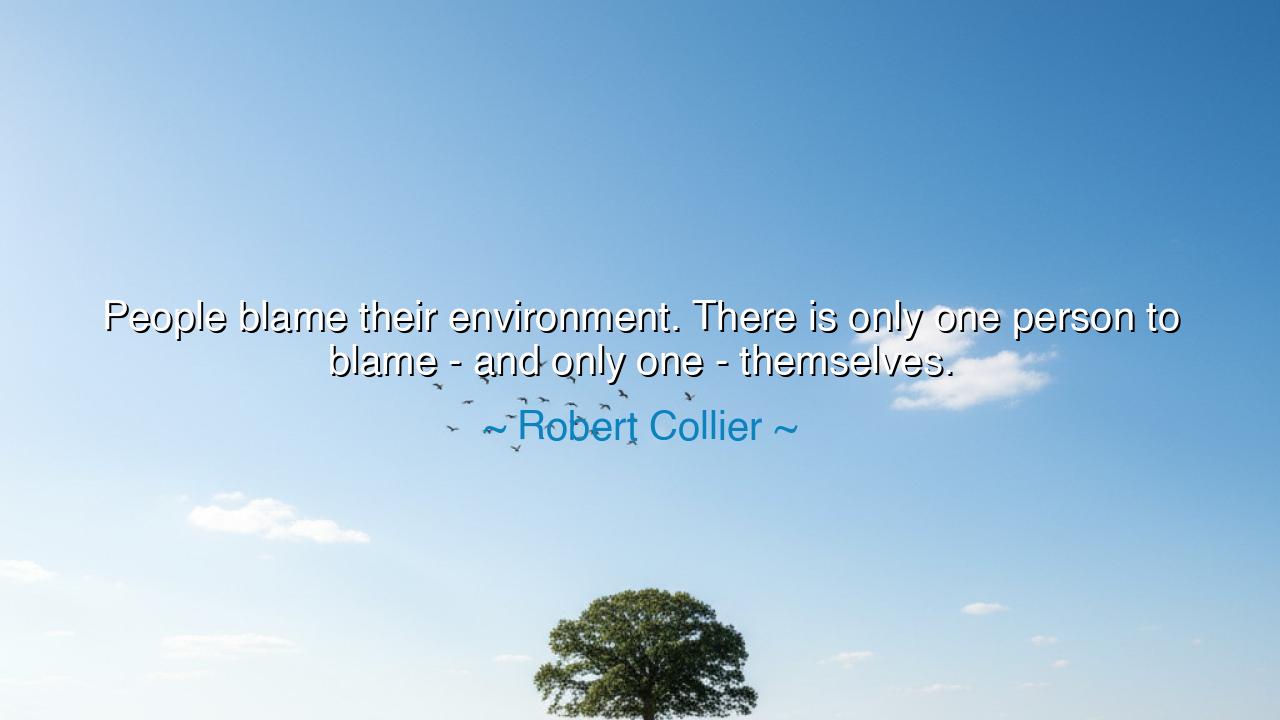
People blame their environment. There is only one person to blame
People blame their environment. There is only one person to blame - and only one - themselves.






In the resolute and stirring words of Robert Collier, one of the great teachers of self-mastery and motivation, we find a truth that has echoed since the dawn of human thought: “People blame their environment. There is only one person to blame—and only one—themselves.” This declaration pierces like an arrow into the heart of excuse and weakness. It is a call to awaken the inner power that slumbers within every human being—a reminder that fate is not shaped by circumstance, but by choice. For in every age, there are those who rise above hardship and those who are broken by it. The difference between them, Collier teaches, is not the world around them, but the spirit within.
To understand this truth, one must see life not as a thing that happens to us, but as a field upon which we act. The environment—the city we are born into, the family that raised us, the trials we endure—is but the stage. The self is the actor, the author, and the director. Those who blame their surroundings for their misfortune surrender their power to shape their destiny. But those who look inward, who take responsibility, discover that the true battleground of success and peace is not outside, but within the mind and the will. Collier’s words, though born of the early twentieth century, carry the eternal wisdom that once guided the Stoics of old, the sages of the East, and the heroes of every civilization.
In ancient times, Epictetus, the slave-turned-philosopher of Rome, spoke a similar truth: “It is not what happens to you, but how you react to it that matters.” Though he was born into chains, he became free through the power of his mind. His environment was harsh beyond measure, yet he did not curse it—he mastered himself within it. He learned that freedom is not given by circumstance, but seized by understanding. So too does Collier echo this sacred insight: that every human being possesses the divine gift of choice. We cannot command the wind, but we can set our sails. We cannot still the storm, but we can learn to navigate through it.
The weakness of blaming the environment is that it binds us to stagnation. When we say, “I am this way because of my past, my poverty, my surroundings,” we give the reins of our destiny to forces beyond our control. Yet history is filled with those who began in ashes and rose to greatness through self-determination. Consider Abraham Lincoln, who was born in a log cabin, poor and uneducated, yet became one of the greatest leaders of his time. His hardships did not define him—they refined him. In his struggle, he did not see chains, but challenges. He chose responsibility over complaint, action over despair. In this, he lived the truth that Collier proclaimed centuries later: that the greatest enemy and the greatest ally a man will ever face is himself.
Collier’s wisdom also speaks to the subtle temptation of victimhood that grows in the hearts of men. It is easier to blame the world than to change oneself. It is easier to say, “I cannot succeed because life is unfair,” than to rise and confront one’s own fears, habits, and limitations. But the ancients knew—and Collier reaffirmed—that every soul is a reflection of the Creator’s will, endowed with the power to transform suffering into strength. To waste that power by surrendering it to circumstance is to deny one’s own divinity. The noble spirit, when pressed by adversity, does not shrink—it expands. Like the oak that grows stronger in the storm, it learns to root itself deeper in self-discipline and resolve.
Yet Collier’s teaching is not without compassion. When he says that one must blame only oneself, he does not speak in cruelty, but in liberation. For when we accept that our lives are our own to shape, we gain the power to change them. No longer do we wait for fate to turn its wheel; we become the wheel itself. The environment, once feared as an enemy, becomes our teacher. Every trial becomes a lesson, every failure a forge. Responsibility becomes not a burden, but a crown—the mark of one who has chosen to live consciously, to steer his own destiny.
So, O seeker of truth and strength, take this lesson to heart: cease blaming the world for what it has given you. The mountain stands not to block your path, but to test your climb. The storm comes not to destroy, but to awaken your endurance. Look within, for the power to rise already burns there. Responsibility is freedom, and freedom is the birthright of all who dare to claim it.
Remember the words of Robert Collier, and let them guide your every act: “People blame their environment. There is only one person to blame—and only one—themselves.” When you live by this truth, you cease to be a prisoner of the world and become its master. Then, like the heroes of old, you will stand not as a product of circumstance, but as a creator of destiny—one whose strength was born not from ease, but from the courage to face the mirror and say, “Here begins my power.”






AAdministratorAdministrator
Welcome, honored guests. Please leave a comment, we will respond soon